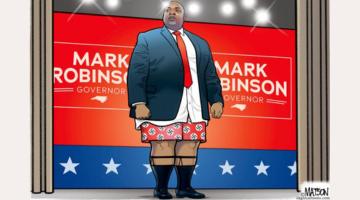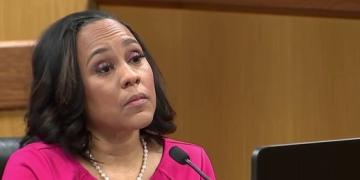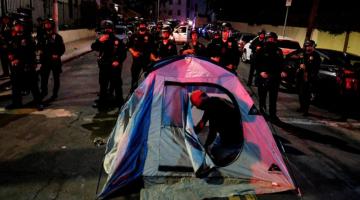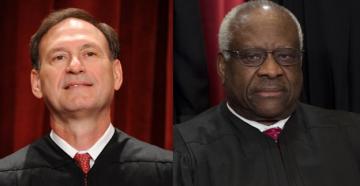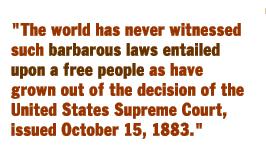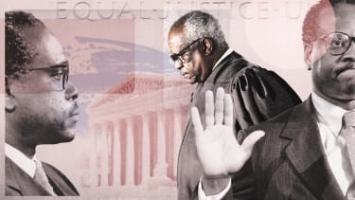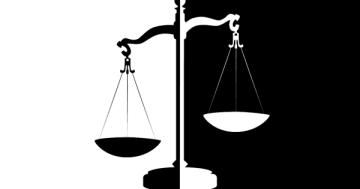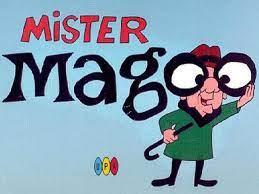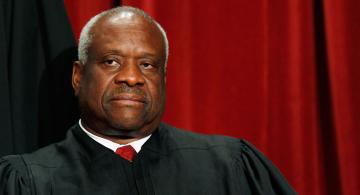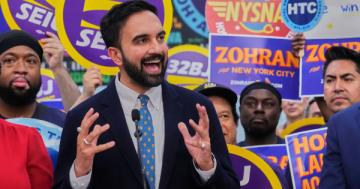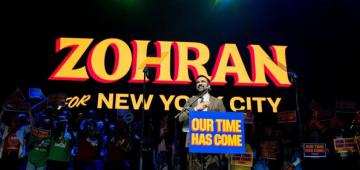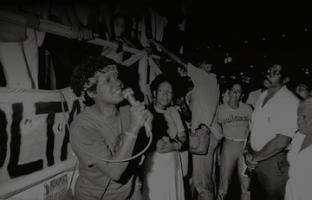An essay by the late Glen Ford recounts the perverse origin story of the twisted life and lies of Clarence Thomas.
Glen Ford’s biographical essay on Clarence Thomas is as devastating now as it was when it was first written in 2007. But it is perhaps more disturbingly relevant fifteen years later, given Thomas’s concurring opinion in Dobbs v. Jackson Women’s Health Center, and as Thomas’s wife, Donald Trump supporter Virginia “Ginny” Thomas, attempted to overturn the results of the 2020 US presidential election. Ford eviscerates Thomas – “the most hated Black Man in Black America” – showing him to be a cruel, vengeful figure, a liar who has lost track of his own lies, a nightmarish, malignant, and poisonous byproduct of affirmative action whose unhinged hatred of Black people is mirrored by his unembarrassed and slavish love for his white masters. Ford writes that “...this essay is about the American pathology that creates a freak like Clarence Thomas, from which tragedy a host of judicial abominations has flowed.” “The stream of bile, Ford warned us, “may continue another 30 or more years.”
To mark the one-year anniversary of Ford’s death, we reprint his remarkable, uncompromising analysis of Thomas below. It is also a reminder of how great a writer he was, and how great a loss he is to the movement. We miss you, brother.
Clarence Thomas, the “Anti-Black”
Glen Ford
Clarence Thomas is a deeply troubled man - a grotesquely twisted, “Down Home”-grown Black personality at war with the demons of his dark-skinned, dirt poor youth. Although Thomas has accumulated many “enemies” - earned and imagined - since his entrance to the white world in the 10th grade in Savannah, Georgia, his core pathology is Black-directed - a trait so obvious it was immediately perceived by a succession of white Republican racists who rocketed him to the U.S. Supreme Court with obscene haste to become a hit-man against his own people.
Thomas is a perverse right-wing joke played on Blacks and, being of above average intelligence despite his mental illness, he knows it. But it is a knowledge he cannot endure, a burden that has made him a pathological liar, who blurts out contradictions so antithetical to each other that they cannot possibly coexist in the same brain without a constant roiling and crashing that puts him at flight from himself and all those who remind him of his now hopelessly entangled torments and tormentors.
If African Americans had our own insane asylum, Thomas would be welcomed in and cared for, with proper compassion for the sorely afflicted. But there are no such facilities available to treat a man who forgives whites for Jim Crow and every other aspect of past and present discrimination - indeed, embraces the most racist among them - but can never forgive Blacks for the way they treated him in Savannah, Georgia and the outlying shanty town of Pin Point.
Thomas, the affirmative action kid, should have gone to Yale, where he proved to be as adept at navigating the curriculum as at least half the rest of the class. He should not have ascended anywhere near the U.S. Supreme Court, or to any government agency that affects the fate of the people he despises, and has since childhood felt despised by: African Americans, the only group that could make his young psyche scream by calling him “ABC” - “America's Blackest Child.” Thomas titled his first and only book My Grandfather's Son, in honor of grandfather Myers Anderson, who physically rescued him from the abject poverty of Pin Point at age seven, at his destitute mother's request, but never let young Clarence forget that he was born in the mud of deepest, lowest class, Gullah-speaking (Geetchie) Blackdom. “Whenever he'd get angry at Clarence,” a childhood friend of Thomas told Washington Post reporter Juan Williams , in 1987, “he'd say, ‘Oh, you from Pin Point.’” Grandfather Anderson, a self-made, semi-literate businessman, alternately wielded “Pin Point” as the most cutting insult to the boy's value as a human being, and as the low-life nightmare to which Clarence must return if he did not show himself worthy of elevation above the mud.
Grandfather Anderson was a committed member of the NAACP, a regular contributor of money to the cause. He coerced Clarence to read his good grades aloud in front of NAACP meetings, an experience the shy child found painfully intrusive. When Clarence gained entrance to an almost lily-white Catholic seminary, with vague ideas about becoming a priest, old man Anderson warned, “don't you shame me and don't you shame your race.”
Too much pressure for the emotionally fragile kid, who had been ceaselessly reminded that his Pin Point background was a shame on its face, and that he must begin his climb up from a deep hole to rise to the standards of the upscale-dominated Savannah NAACP - a tall order for “America's Blackest Child.” In a 2002 interview with Washington Post reporters Kevin Merida and Michael A. Fletcher, Thomas said he “can't think of any” good the NAACP ever did. Civil rights leaders, in general, just “bitch, bitch, bitch, moan and moan, whine and whine.”
The overbearing, unrelenting Granddaddy Anderson pinned his hopes on Clarence graduating from the Catholic seminary and using his credentials and education to assist other Blacks. However, Clarence quit in 1968, and Anderson put him out of the house. Thomas' lying memory begins to dominate the narrative at this point in his 19-year-old life, with estrangement from his Black anchor and hate-love object, Granddaddy Anderson. The old man and the NAACP expected great things from young Clarence, based on their standards, schedule and mission. Thomas claims he quit the seminary when, on news of the shooting of Dr. Martin Luther King, Jr., he overheard a white student say “Well, that's good. I hope the SOB dies” - evidence that the Catholic Church had failed him. Note that Thomas does not punch the white kid out, for which he might have been expelled. He just quit, and in so doing quit his grandfather and the NAACP, as well. Although the alleged remark is totally plausible, given the blatant, unabashed racism that prevailed in Sixties white Georgia campuses, parochial and public, it is equally implausible that Thomas had not heard, and been personally subjected to, many verbal racial assaults during his time at the seminary - and never reacted. It is much more likely that Thomas, having already charted his exit from Black Savannah and a path to the Ivy league, later invented or used the incident to cast himself as a “radical” - the pose he (possibly after-the-fact) adopted during his scholarship-assisted and affirmative action-arranged stay at Yale, his next stop.
Thomas was sick and tired of Savannah Black society and the loathsome burden of his Pin Point origins, and the skin-curse of being “ABC.” He would exit the former and use the latter as a swinging broadsword to flail his Black “tormentors” and garner the assistance of racist whites in search of an African American who harbored animosities against Blacks as intense as their own. In his September 30, 2007, interview with 60 Minutes , Thomas seemed still to be repelled by the Black catechism and recitals he had been subjected to by old man Anderson and the NAACP, back in Savannah so many years ago. The problem is, all these decades later, Thomas disengages Granddaddy Anderson from the local NAACP he fervently supported, and to which he offered his grandson as a prize catch and future leader. Thomas told milque-toast interviewer Steve Kroft: “You've been down here long enough [the interview took seven days to complete] to see who raised me and what my grandfather - what approach would he take?” Thomas says, laughing. “It'd be get out there and work. The problem for me isn't that everybody agrees with him or me. But, that they think they have the exclusive providence of how to approach it. That I am to be destroyed because I won't drink that Kool-Aid or because I don't follow in this cult-like way something that blacks are supposed to believe. I have an opinion. It seems as though the problem with me and other people with our opinions is that we are veering away from the black gospel that we're supposed to adhere to.”
Clarence abandoned the high-pressure, struggle-for-your-folks Gospel of the Savannah NAACP and his grandfather - the people pushing the Kool-Aid - for Yale, where he donned a beret and now claims to have been a militant. As reported by Kevin Merida and Michael A. Fletcher in 2002, Thomas' memory is . . . faulty: “That’s garbage, all this radical crap,” says Edward P. Jones, a writer who went to college with Thomas. “If something came along and it didn't interfere with whatever he was doing that day, he would do it . . . My recollection is he wasn't the rah-rah out-front guy others are portraying him to be.”
However, Thomas may have imagined himself to be something his brow-beaten upbringing and disturbed mind did not prepare him to even recognize. After all, he had a beret, and a bad attitude. But who was he really mad at?
Time would tell, and not that much time, either. Thomas got through Yale Law School at the middle of his class, then claims he put a 15-cents sticker on the diploma and shunted it off to the basement in passive protest of the document being devalued and “tainted” by affirmative action. If Thomas’ diploma story is true, then by graduation he had already, in 1974, become a right-wing opponent of the affirmative action that had benefited him right up to the point that he shook the Law School dean's hand and accepted the diploma. Thomas certainly had felt himself devalued for most of his conscious existence - and was repeatedly confirmed in that devaluation by his Black peers and elders in Savannah until his self-image broke from the strain, if he ever had a well-developed self-image. But one wonders at what point he made the switch from flirting with the Black Panthers (or, in his case, beret-ism) to a doctrinaire reactionary position that had not, at the time, been widely articulated in the popular press. One strongly suspects that Thomas’ current narrative of the period is a revision - and also that Thomas believes every word of the story. After all, Thomas claims to have assiduously avoided studying any civil rights cases at law school, and later urged students to do the same. With the ordeal of being a “testimony” child of the NAACP and his grandfather still fresh in his resentful mind, Thomas wanted nothing to do with “civil rights” of any kind - a permanent bent that rendered him singularly unqualified for the life-path that would begin right after graduation, when the enemies of civil rights took him under their wings, and crafted him into a weapon against every vestige of the Black Freedom Movement.
Do not believe anything Clarence Thomas says, since his statements are almost uniformly lies of commission or omission. It is doubtful that he knows which. He claims not to have been able to “get a job” after graduation from Yale, when in fact he soon got a dream position for any young Black man looking for a fast track into the heart of rising Republican rightwing politics. The Black GOP list wasn't just short, it was almost non-existent. Missouri Attorney General John “Jack” Danforth snatched up the boy from Pin Point in a New York minute, doubtless after getting an earful from the Yale graduate about the demeaning nature of Ivy League affirmative action. The $10,000 a year salary sounds paltry in current dollars, but in 1974 it was quite enough for a single recent grad. More to the point, Thomas was an Assistant Attorney General, a title for which many graduates would intern without salary. Most importantly, Thomas had found a mentor and protector in Danforth, who would stick by (or use) him through to the 1991 Senate confirmation process. “ABC” had found his niche. He would not return to Pin Point to dedicate his law skills to the folks, as his grandfather so dearly wished. The beret was gone, too.
Clarence promptly picked up his first book on Black “conservatism” (or, he may have read it in preparation for the Danforth interview - the record is nonexistent). Thomas Sowell’s intellectually primitive Race and Economics was, according to Thomas, his introduction to the tiny grouplet of rightwing Black fellow-travelers hoping to get in on the ground floor whenever a national change of regime might occur. With Danforth as his guide, Thomas was on the launching pad. The Missouri attorney general became a U.S. senator in 1979, with Clarence in tow all the way to Washington. However, like most deeply damaged personalities, Thomas could not face the raw realities of his situation; he preferred to make up an alternative persona that was the opposite of what he had become. Juan Williams, the then-young Washington Post reporter who would himself descend into rightist politics in his later years, followed Thomas to a conference of Black conservatives in San Francisco, in early 1981, shortly after Ronald Reagan assumed the presidency: “His frankness in reflecting on his own position as a black conservative is, in retrospect, touched by irony. ‘If I ever went to work for the EEOC or did anything directly connected with blacks, my career would be irreparably ruined. The monkey would be on my back to prove that I didn't have the job because I'm black. People meeting me for the first time would automatically dismiss my thinking as second-rate.’”
“Monkey” is an interesting choice of words. But then, as Juan Williams reported: “...in May of 1981, despite his misgivings, he joined the Administration as the Department of Education's assistant secretary for civil rights.”
And then:
“Eight months after he began his job at the Department of Education, the President nominated him to head the EEOC.”
And then, in 1990, President George H. W. Bush appointed Thomas to the U.S. appellate court for the District of Columbia, where he remained for barely a year before Bush nominated him to the U.S. Supreme Court, in 1991.
In 12 short years, the man who said “civil rights” appointments were “career suicide” had been catapulted from an aide to Sen. Danforth to lifetime Associate Supreme Court Justice, without ever having tried a case as a lawyer or worked at a law firm.
Did Thomas ever believe anything he said about the perils of being tagged as among the “Black” and “civil rights” categories of job seekers? The question would be appropriate if we were speaking of a sane person, but we are not. Thomas is capable of holding several, antithetical realities in his head, and talking out of all sides of his mouth on every one of them - and believing every word. Although most African Americans are quick to point to his affirmative action-enabled Yale education as proof of his hypocrisy on the subject, Thomas flips the script and treats the invaluable experience as if it were worthless, despite the fact that the Ivy League diploma introduced him to his Republican mentor and champion, John Danforth. As late as September 30, [2007], Thomas was still complaining to the compliant and purposely incompetent 60 Minutes correspondent Steve Kroft about his “tainted” diploma, worth only 15 cents. The truly obscene “affirmative action” from which Thomas has benefited is Republican-made - a cascade of rewards for being the “Anti-Black” who can be counted on to bludgeon and bad-mouth his own people at every opportunity, while his benefactors snicker at the joke. That’s why Thomas so richly deserved Emerge magazine’s 1994 depiction of him as a lawn jockey, a cartoonish figure placed on lawns by whites to remind everyone of Black subservience.
Thomas has written over 300 High Court opinions, about par for the course. He has been a minority-of-one more often than any other Justice, simply because, despite being surrounded by clerks educated in the chapter-and-verse of precedent and statute, Thomas repeatedly casts the fundamentals of judgeship aside to vent his venom, hostility, pent-up pain, and desire for vengeance - against his fellow African Americans.
Thomas imagines himself a man of the people. “Man, quotas are for the black middle class. But look at what's happening to the masses. Those are my people. They are just where they were before any of these policies,” Thomas told a reporter. But Clarence from Pin Point certainly isn’t where he used to be. And the almost exclusively poor and disproportionately Black prison population would be in even worse shape if Thomas’ 1992 dissent in a “cruel and unusual treatment” case had been joined by the majority of the High Court. Angola, Louisiana, prisoner Keith Hudson was left “with loosened teeth, facial bruises and a cracked dental plate” after being shackled and taken to a secluded place to be beaten by guards. “In my view,” wrote Clarence The Man of the People, “a use of force that causes only insignificant harm to a prisoner may be immoral, it may be tortious, it may be criminal...but it is not ‘cruel and unusual punishment.’”
One wonders how much harm would satiate Thomas’ lust for revenge against those Blacks who make his life difficult by breathing. Other Justices, including his fellow “conservatives,” could not conceal their astonishment at the baldness and legal vacuity of Thomas’ opinion. And there were many more such opinions, too many for this essay, which is about the sick mind of the man and how it has been employed by Black folks’ enemies as both a pit bull and a pet.
Thomas, the ultimate fast-tracked Black, voted against so-called “quotas” in awarding federal highway contracts, citing “paternalism” as a mortal sin. “There can be no doubt that racial paternalism and its unintended consequences can be as poisonous and pernicious as any other form of discrimination.”
Then you, Clarence, should be dead, many times over, fatally poisoned. But, Thomas may have a point. Grandpa Anderson’s grooming of young Clarence as a champion of the race did, indeed, have “unintended consequences.”
Again, this essay is about the American pathology that creates a freak like Clarence Thomas, from which tragedy a host of judicial abominations has flowed. He is only 59. The stream of bile may continue another 30 or more years, if he does not blow a brain vein from sheer maliciousness. Thomas is most fond of talking about the concept of racial “assimilation” - he’s against it, which is quite strange for an “ABC” from Pin Point who has succeeded in thoroughly insinuating himself into the rich, white circles of power that arranged for him to secure possibly the most coveted job in the land.
To win racist white favor and praise, Thomas has signaled that he does not recognize the logic of the 1954 Brown school desegregation decision. “‘Racial isolation’ itself is not a harm; only state-enforced segregation is. After all, if separation itself is a harm, and if integration therefore is the only way that blacks can receive a proper education, then there must be something inferior about blacks.” If there were ever an example of how 13 years of racial isolation can damage a dirt-poor young Black boy from Pin Point, Georgia, Clarence Thomas is it. He was beaten down before he had his first meaningful conversation with a white person - before he could establish an identity that could carry him forward as a proud Black man in a white-dominated world - and soon would begin a career as an attack dog for the worst elements of the ruling class.
Most often, like most crazy people, Clarence's utterances have no connection to his own circumstances. He doesn't know where he is, or what he has done. “There is nothing you can do to get past black skin,” Thomas told reporter Juan Williams, back in 1987. “I don't care how educated you are, how good you are at what you do - you'll never have the same contacts or opportunities, you'll never be seen as equal to whites.”
Unless, of course, you serve the interests of those whites you believe are in charge of your destiny. But that's too rational a thought to put in Thomas’ head; he just glides along on pure hatred of himself and his own. Thomas has been enabled in his crazed leap to the pinnacles of power by forces that are arrayed against the masses of all people, but especially African Americans. Clearly, this includes CBS Television, as evidenced by the recent 60 Minutes charade.
Journalistic eunuch Steve Kroft absolved Thomas of all the lies and insanities he has spouted over the years, and his clear unfitness for the job - almost any job - at the start of the broadcast: “He is often dismissed as a man of little accomplishment, an opportunistic black conservative who sold out his race, joined the Republican Party and was ultimately rewarded with an affirmative action appointment to the nation's highest court, a sullen, intellectual lightweight so insecure he rarely opens his mouth in oral arguments. The problem with the characterization is that it's unfair and untrue.”
Untrue and unfair, says he. Yet Kroft never delved into any of those important questions, preferring to focus on the 1991 Anita Hill confirmation hearings charges. Thomas slickly slimed Hill, and 60 Minutes did not permit the other side to speak. Even the most casual news programming observer must conclude that either Thomas’ publishers (or His Judgeship, himself) imposed a prohibition on substantive questioning, or that CBS liked what they heard, and left it at that. We at Black Agenda Report have received confidential information that the latter is the case; that the white powers-that-be at 60 Minutes and corporate management felt poor Clarence, who is undeniably the most hated Black Man in Black America, should get to have his say, unmolested by the truth. There goes the journalistic neighborhood, bulldozed by white comfort-zone preference.
Karen J. Bond, of the National Black Coalition for Media Justice, offered a detailed questionnaire to the producers of the 60 Minutes farce, including: “Do you feel an interview excluding...critical pieces of information about the content of Justice Thomas’ book would leave the viewer with an accurate perspective? Why was there little or no attention given to the opinions of these critics who come from the ranks of his peers, his former classmates, highly esteemed literary figures or the poor and working class citizens that he claims he represents? With so much contradictory evidence available, why was there no substantial challenge made as to the veracity of the claims Thomas presents in his book?”
No remotely satisfactory answer was forthcoming. We must conclude that Clarence Thomas is crazy like a fox, having somehow sensed through the fog of near-lifelong mental illness that powerful “white folks” will take care of him as long as he exhibits a visceral contempt for other Blacks. The crybaby - demented and consumed by a huge reservoir of perceived assaults that make him appear like a Black, stocky, middle-aged version of the pitiful-but-pathological character Gollum, in J.R.R. Tolkien's Lord of the Rings - is incapable of a coherent narrative of his own experiences or political views. He gets away with it because significant numbers of whites want to hear a “dissident” Black voice railing against the rest of Black America - no matter how crazed that voice might be. 60 Minutes dubbed its book promotion masquerading as journalism, “Clarence Thomas: The Justice Nobody Knows.” They then proceeded to make sure nobody would really know him, if they didn't already.
Possibly the most pathologically illuminating portion of the network PR job came at the end of the interview. Thomas, asked where he feels he is in life, responds: “I’m Home.” Home is what Clarence has been running from all along - although he can't escape the formative environment in which he sickened so early in life. He’s really in Purgatory, and trying to put the rest of us in Hell.
Glen Ford, “Clarence Thomas, the ‘Anti-Black,’” Black Agenda Report, 10 October 2007.

